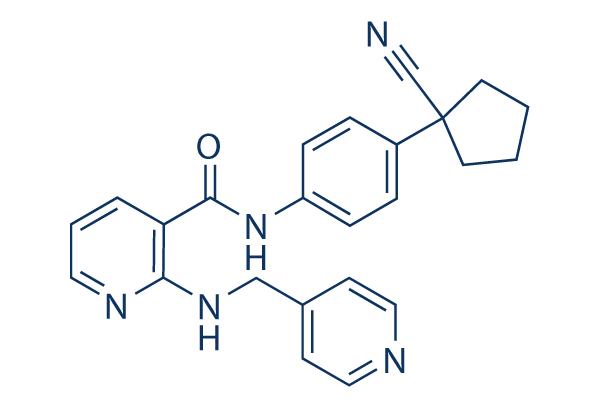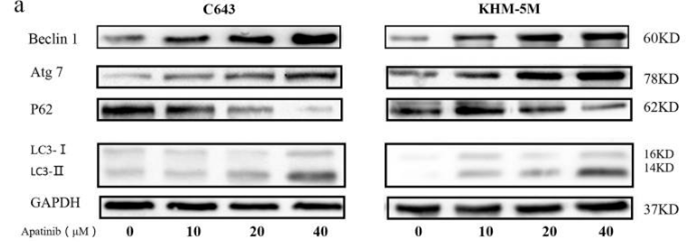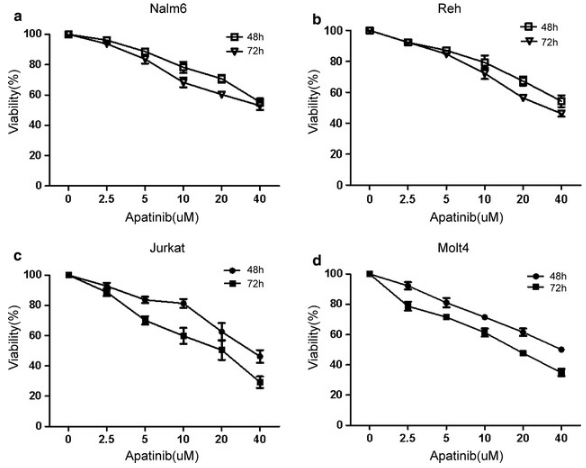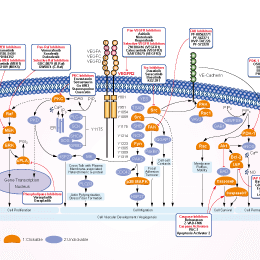
- Bioactive Compounds
- By Signaling Pathways
- PI3K/Akt/mTOR
- Epigenetics
- Methylation
- Immunology & Inflammation
- Protein Tyrosine Kinase
- Angiogenesis
- Apoptosis
- Autophagy
- ER stress & UPR
- JAK/STAT
- MAPK
- Cytoskeletal Signaling
- Cell Cycle
- TGF-beta/Smad
- DNA Damage/DNA Repair
- Compound Libraries
- Popular Compound Libraries
- Customize Library
- Clinical and FDA-approved Related
- Bioactive Compound Libraries
- Inhibitor Related
- Natural Product Related
- Metabolism Related
- Cell Death Related
- By Signaling Pathway
- By Disease
- Anti-infection and Antiviral Related
- Neuronal and Immunology Related
- Fragment and Covalent Related
- FDA-approved Drug Library
- FDA-approved & Passed Phase I Drug Library
- Preclinical/Clinical Compound Library
- Bioactive Compound Library-I
- Bioactive Compound Library-Ⅱ
- Kinase Inhibitor Library
- Express-Pick Library
- Natural Product Library
- Human Endogenous Metabolite Compound Library
- Alkaloid Compound LibraryNew
- Angiogenesis Related compound Library
- Anti-Aging Compound Library
- Anti-alzheimer Disease Compound Library
- Antibiotics compound Library
- Anti-cancer Compound Library
- Anti-cancer Compound Library-Ⅱ
- Anti-cancer Metabolism Compound Library
- Anti-Cardiovascular Disease Compound Library
- Anti-diabetic Compound Library
- Anti-infection Compound Library
- Antioxidant Compound Library
- Anti-parasitic Compound Library
- Antiviral Compound Library
- Apoptosis Compound Library
- Autophagy Compound Library
- Calcium Channel Blocker LibraryNew
- Cambridge Cancer Compound Library
- Carbohydrate Metabolism Compound LibraryNew
- Cell Cycle compound library
- CNS-Penetrant Compound Library
- Covalent Inhibitor Library
- Cytokine Inhibitor LibraryNew
- Cytoskeletal Signaling Pathway Compound Library
- DNA Damage/DNA Repair compound Library
- Drug-like Compound Library
- Endoplasmic Reticulum Stress Compound Library
- Epigenetics Compound Library
- Exosome Secretion Related Compound LibraryNew
- FDA-approved Anticancer Drug LibraryNew
- Ferroptosis Compound Library
- Flavonoid Compound Library
- Fragment Library
- Glutamine Metabolism Compound Library
- Glycolysis Compound Library
- GPCR Compound Library
- Gut Microbial Metabolite Library
- HIF-1 Signaling Pathway Compound Library
- Highly Selective Inhibitor Library
- Histone modification compound library
- HTS Library for Drug Discovery
- Human Hormone Related Compound LibraryNew
- Human Transcription Factor Compound LibraryNew
- Immunology/Inflammation Compound Library
- Inhibitor Library
- Ion Channel Ligand Library
- JAK/STAT compound library
- Lipid Metabolism Compound LibraryNew
- Macrocyclic Compound Library
- MAPK Inhibitor Library
- Medicine Food Homology Compound Library
- Metabolism Compound Library
- Methylation Compound Library
- Mouse Metabolite Compound LibraryNew
- Natural Organic Compound Library
- Neuronal Signaling Compound Library
- NF-κB Signaling Compound Library
- Nucleoside Analogue Library
- Obesity Compound Library
- Oxidative Stress Compound LibraryNew
- Plant Extract Library
- Phenotypic Screening Library
- PI3K/Akt Inhibitor Library
- Protease Inhibitor Library
- Protein-protein Interaction Inhibitor Library
- Pyroptosis Compound Library
- Small Molecule Immuno-Oncology Compound Library
- Mitochondria-Targeted Compound LibraryNew
- Stem Cell Differentiation Compound LibraryNew
- Stem Cell Signaling Compound Library
- Natural Phenol Compound LibraryNew
- Natural Terpenoid Compound LibraryNew
- TGF-beta/Smad compound library
- Traditional Chinese Medicine Library
- Tyrosine Kinase Inhibitor Library
- Ubiquitination Compound Library
-
Cherry Picking
You can personalize your library with chemicals from within Selleck's inventory. Build the right library for your research endeavors by choosing from compounds in all of our available libraries.
Please contact us at [email protected] to customize your library.
You could select:
- Antibodies
- Bioreagents
- qPCR
- 2x SYBR Green qPCR Master Mix
- 2x SYBR Green qPCR Master Mix(Low ROX)
- 2x SYBR Green qPCR Master Mix(High ROX)
- Protein Assay
- Protein A/G Magnetic Beads for IP
- Anti-Flag magnetic beads
- Anti-Flag Affinity Gel
- Anti-Myc magnetic beads
- Anti-HA magnetic beads
- Magnetic Separator
- Poly DYKDDDDK Tag Peptide lyophilized powder
- Protease Inhibitor Cocktail
- Protease Inhibitor Cocktail (EDTA-Free, 100X in DMSO)
- Phosphatase Inhibitor Cocktail (2 Tubes, 100X)
- Cell Biology
- Cell Counting Kit-8 (CCK-8)
- Animal Experiment
- Mouse Direct PCR Kit (For Genotyping)
- New Products
- Contact Us
Apatinib
Synonyms: Rivoceranib, YN968D1
Apatinib (Rivoceranib, YN968D1) is a potent inhibitor of the VEGF signaling pathway with IC50 values of 1 nM, 13 nM, 429 nM and 530 nM for VEGFR-2, Ret (c-Ret), c-Kit and c-Src, respectively. Apatinib induces both autophagy and apoptosis.

Apatinib Chemical Structure
CAS No. 811803-05-1
Purity & Quality Control
Batch:
Purity:
99.91%
99.91
Apatinib Related Products
Signaling Pathway
Biological Activity
| Description | Apatinib (Rivoceranib, YN968D1) is a potent inhibitor of the VEGF signaling pathway with IC50 values of 1 nM, 13 nM, 429 nM and 530 nM for VEGFR-2, Ret (c-Ret), c-Kit and c-Src, respectively. Apatinib induces both autophagy and apoptosis. | ||||
|---|---|---|---|---|---|
| Targets |
|
| In vitro | ||||
| In vitro | Apatinib (YN968D1) potently suppressed the kinase activities of VEGFR-2, c-kit and c-src, and inhibited cellular phosphorylation of VEGFR-2, c-kit and PDGFRβ. YN968D1 suppress the activities of Ret, c-kit and c-src with an IC50 of 0.013 μM, 0.429 μM and 0.53 μM, respectively. YN968D1 had no significant effects on EGFR, Her-2 or FGFR1 in concentrations up to 10 μM. YN968D1 effectively inhibited proliferation, migration and tube formation of human umbilical vein endothelial cells induced by FBS, and blocked the budding of rat aortic ring[1]. | |||
|---|---|---|---|---|
| Cell Research | Cell lines | HUVEC | ||
| Concentrations | 0.1 and 1 μM | |||
| Incubation Time | 72 h | |||
| Method | The HUVEC were seeded into 96-well plates. After 24 h of incubation, cells were exposed to the test agents (vehicle as control) together with 20 ng ⁄mL VEGF or 20% FBS for another 72 h. After fixation with 10% trichloroacetic acid, the cells were stained with 0.4% sulforhodamine B for 30 min at 37℃ and then washed with 1% acetic acid. Tris was added to dissolve the complex, and the optical density was measured at 520 nm. |
|||
| Experimental Result Images | Methods | Biomarkers | Images | PMID |
| Western blot | Beclin 1 / Atg7 / p62 / LC3-I / LC3-II PI3K / p-PI3K / mTOR / p-mTOR / AKT / p-AKT p-VEGFR2 / VEGFR2 / p-ERK / ERK |

|
30301881 | |
| Growth inhibition assay | Cell viability |

|
29490645 | |
| In Vivo | ||
| In vivo | In vivo, YN968D1 alone and in combination with chemotherapeutic agents effectively inhibited the growth of several established human tumor xenograft models with little toxicity[1]. | |
|---|---|---|
| Animal Research | Animal Models | tumor xenograft model (NCI-H460 human lung tumors, HCT 116 human colon tumors, or SGC-7901 human gastric tumors; BALB⁄cA nude mice) |
| Dosages | 50, 100 and 200 mg/kg | |
| Administration | by oral gavage | |
| NCT Number | Recruitment | Conditions | Sponsor/Collaborators | Start Date | Phases |
|---|---|---|---|---|---|
| NCT05839197 | Recruiting | Macrotrabecular Massive Hepatocellular Carcinoma |
Wan-Guang Zhang|Tongji Hospital |
May 5 2023 | Phase 2 |
| NCT05742750 | Not yet recruiting | Locally Advanced Biliary Tract Cancer|Metastatic Biliary Tract Cancer |
Sun Yat-sen University|Jiangsu Hengrui Pharmaceutical Co. Ltd. |
March 1 2023 | Phase 1|Phase 2 |
| NCT05287360 | Completed | Healthy |
Elevar Therapeutics |
December 30 2021 | Phase 1 |
| NCT03743428 | Suspended | Colorectal Neoplasms |
Shenzhen People''s Hospital |
October 22 2020 | Not Applicable |
| NCT04517357 | Unknown status | Relapsed Ovarian Cancer |
Jiangsu HengRui Medicine Co. Ltd. |
October 16 2020 | Phase 2 |
Chemical Information & Solubility
| Molecular Weight | 397.47 | Formula | C24H23N5O |
| CAS No. | 811803-05-1 | SDF | -- |
| Smiles | O=C(NC1=CC=C(C=C1)C2(CCCC2)C#N)C3=C(NCC4=CC=NC=C4)N=CC=C3 | ||
| Storage (From the date of receipt) | 3 years -20°C powder | ||
|
In vitro |
DMSO : 100 mg/mL ( (251.59 mM) Moisture-absorbing DMSO reduces solubility. Please use fresh DMSO.) Water : Insoluble |
Molecular Weight Calculator |
|
In vivo Add solvents to the product individually and in order. |
In vivo Formulation Calculator |
||||
Preparing Stock Solutions
Molarity Calculator
In vivo Formulation Calculator (Clear solution)
Step 1: Enter information below (Recommended: An additional animal making an allowance for loss during the experiment)
mg/kg
g
μL
Step 2: Enter the in vivo formulation (This is only the calculator, not formulation. Please contact us first if there is no in vivo formulation at the solubility Section.)
% DMSO
%
% Tween 80
% ddH2O
%DMSO
%
Calculation results:
Working concentration: mg/ml;
Method for preparing DMSO master liquid: mg drug pre-dissolved in μL DMSO ( Master liquid concentration mg/mL, Please contact us first if the concentration exceeds the DMSO solubility of the batch of drug. )
Method for preparing in vivo formulation: Take μL DMSO master liquid, next addμL PEG300, mix and clarify, next addμL Tween 80, mix and clarify, next add μL ddH2O, mix and clarify.
Method for preparing in vivo formulation: Take μL DMSO master liquid, next add μL Corn oil, mix and clarify.
Note: 1. Please make sure the liquid is clear before adding the next solvent.
2. Be sure to add the solvent(s) in order. You must ensure that the solution obtained, in the previous addition, is a clear solution before proceeding to add the next solvent. Physical methods such
as vortex, ultrasound or hot water bath can be used to aid dissolving.
Tech Support
Answers to questions you may have can be found in the inhibitor handling instructions. Topics include how to prepare stock solutions, how to store inhibitors, and issues that need special attention for cell-based assays and animal experiments.
Tel: +1-832-582-8158 Ext:3
If you have any other enquiries, please leave a message.
* Indicates a Required Field
Tags: buy Apatinib | Apatinib supplier | purchase Apatinib | Apatinib cost | Apatinib manufacturer | order Apatinib | Apatinib distributor







































